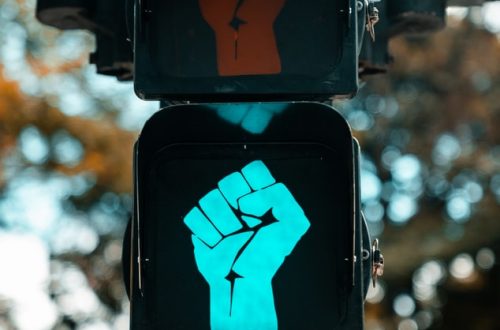 David Gushee has a stimulating column at RNS arguing that “strident” calls for civil disobedience in the wake of Obergefell are empty. Yes, federal policy now disfavors those who adhere to a traditional definition of marriage, but there really isn’t any relevant way for Christians to disobey the government—at least not where things stand now. Instead, he argues that Christians will have to face the crushing consequences of their views and that they have no appropriate way to “disobey” in order to resist:
David Gushee has a stimulating column at RNS arguing that “strident” calls for civil disobedience in the wake of Obergefell are empty. Yes, federal policy now disfavors those who adhere to a traditional definition of marriage, but there really isn’t any relevant way for Christians to disobey the government—at least not where things stand now. Instead, he argues that Christians will have to face the crushing consequences of their views and that they have no appropriate way to “disobey” in order to resist:
It seems very unlikely that government would simply mandate that Christian organizations change such policies. It might, however, withdraw tax-exempt status, not from churches, but from church-related organizations. Or it might ban federal funds, such as government social-service contracts, research grants, or student loans, from going to such organizations. This is not the same thing as simply banning such organizations from adhering to their preferred policies, but for many organizations it remains a nightmare scenario.
There would be no form of civil disobedience available in such cases. In actuality, their real fight would be within the legal and political system, and it is in fact already happening. If these organizations stick to their policies, and if government moves in the direction I have just indicated (which is by no means a certainty), no organizational leader will be arrested or imprisoned. No organization will be raided and padlocked. No civil disobedience strategy will be relevant. Instead, such organizations essentially will be quarantined off from government dollars, with predictably scary bottom-line and reputational effects.
Gushee’s argument here is really strange in light of recent news about the Christians in Oregon who have been ordered by the state of Oregon not speak about their right to run their business in keeping with their Christian conscience. It was civil disobedience to “The Oregon Equality Act” that got them into their current predicament. And now, it is civil disobedience that keeps them speaking-out in spite of the unjust gag-order from the state. This week—of all weeks—it’s astonishing that Gushee would argue that there are no “relevant” paths of civil disobedience for Christians. The Kleins in Oregon have shown us otherwise.
Gushee also argues that if Christians wish to maintain their ancient beliefs about sexuality and marriage, they need “to prepare for the day when they will have to function without continued access to tax-exempt status or government dollars.” If they don’t want to lose tax-exempt status or access to government dollars, they only have two other options:
(1) Christians can change their marriage policies to get in line with Obergefell while not changing their principles. He argues, “They could do this because they decide that their organizational mission is too important to let it die on the hill of LGBT policies.” Gushee apparently thinks that Christian organizations can embrace gay marriage in their policies but not in their values. But what does that even mean? It is a like a husband telling his wife that he accepts monogamy in principle but that monogamy won’t determine the way he actually lives. That is not a recipe for saving a marriage but for destroying it. Likewise, Gushee’s suggestion is not a way for Christian organizations to maintain their Christian identity but for forfeiting it. In reality, this particular “option” is just rank hypocrisy and not really an option for Christians of conscience.
(2) Christians might simply “reconsider their beliefs about LGBT people and their relationships, as some of us have already done,” says Gushee. In short, this means Christians would need to change their views on marriage to get in line with Obergefell. Obviously, Gushee considers this an option because it’s one he himself has already embraced. But here again, the approach is fundamentally flawed. One cannot deny Christ in the name of Christ and think that they come out on the other side as Christian (Titus 1:16). On the contrary, a high-handed embrace of gay marriage is in reality a low road to perdition. The stakes really are that high (Matthew 7:13-15). This “option” isn’t really an option for Christians either.
The only real option for Christians is to remain true to the word of Christ no matter the cost. For some (like the Kleins in Oregon), that will involve civil disobedience. For others, it will involve suffering social and financial sanction. For others, it may cost even more than that. But this is no surprise to us. Jesus was clear up front that following him would require taking up a cross (Matthew 16:24). And he prepared us for this by promising that we would lose nothing here that we wouldn’t receive back and then some in the age to come (Mark 10:29-30).
In reality, our only option is what it always has been—Christ. He is our plan A, plan B, and plan C. It is a narrow path that leads to life, and there is no other way.




21 Comments
Ian Shaw
“Gushee apparently thinks that Christian organizations can embrace gay marriage in their policies but not in their values”
Apparently, Gushee does not understand that Christian values shape who we are and therefore the policies and values go hand in hand. That’d be like my boss telling me not to take office supplies and everyday he takes a half-dozen swing-line staplers and puts them in his trunk.
I do wonder how they will try to separate out revoking the tax-exempt status from say Christian universities and not churches. As some/many Christian colleges/universities are extensions/arms of a specific church, couldn’t you make the case that the government is favoring 1 religion/faith over another and therefore can’t remove that status from one but not the other? Similar to my counterpoint to Gushee’s statement above- it’s both or nothing, it can’t be one and the not the other at the same time.
Chris Ryan
Its easy for the gov’t to distinguish churches from colleges or other organizations. If the college admits students from outside the denomination and doesn’t hire ppl who don’t practice the faith then its quite hard to argue that a college isn’t discriminating in not admitting gay students. But then you already know the difference, no? One is a seminary, the other is a university. One is Southern Baptist Theological Seminary while the other is Notre Dame. Since Notre Dame admits Muslim students (they even have a Muslim Student Association!) they couldn’t say with a straight that religious principles keep them from admitting gay students. On the other hand SBTS would have no trouble making that argument. That was why Denny circulated that brochure abt how churches can protect themselves the other week.
Ian Shaw
What about Christian universities that have their mission statement, by-laws, etc. that lay out their beliefs, what they stand for et. al., and yet still accept non-Christian students (even if said university asks you a statement of faith question or “why do you wish to attend” when applying?
I ask as my alma mater (Spring Arbor University) did admit non-Christian students, but yet still had a code of conduct that all (students and faculty) were expected to adhere to, with consequences if you did not. Though not being exhaustive in their text, it came back to bite them when a long time professor in the adult studies program decided to publically declare being transgendered and the university dismissed him. You can guess how that lawsuit went because the code of conduct only listed homosexuality, not transgender as an issue.
Christian colleges could get around this if they all decided to refuse any and all federal dollars (government student loans).
Chris Ryan
Christian colleges couldn’t get around employment law by refusing federal funds. The only way to get around employment law is to declare all employees “ministers” (the law won’t really let you do that though) or to be basically “just” a church, meaning that you can’t accept students from outside the faith & that you can’t employ ppl from outside of the faith. If you want to have the protection of a church, you have to be a church (serving only members of the faith), if you want to be more than a church then you have to abide by the laws that other non-churches follow. In general its a pretty reasonable compromise b/cs it disallows hypocrisy. If Notre Dame wanted to say that it couldn’t hire gay ppl it would be pretty hypocritical since it already has Muslim & Jewish professors as faculty. A Code of Conduct wouldn’t really come into it.
Ian Shaw
Not specifically talking about employment law but say private Christian colleges admitting or denying homosexual couples into on campus married housing. If they took no federal dollars and were a private institution, I think they could skirt that, couldn’t they?
Chris Ryan
Probably, Ian, but there are nuances based on Housing Discrimination Law…
Nathan Cesal
Would penalties against a person that posts your name and address on the internet which then leads to death threats and harassment for you and your children be unwarranted?
“The BOLI Final Order awards $60,000 in damages to Laurel Bowman-Cryer and $75,000 in damages to Rachel Bowman-Cryer for emotional suffering stemming directly from unlawful discrimination. The amounts are damages related to the harm suffered by the Complainants, not fines or civil penalties which are punitive in nature.
The Final Order notes that the non-economic damages are consistent with the agency’s previous orders, such as an earlier ruling against a Bend dentist In the Matter of Andrew W. Engle. In that case, BOLI awarded a Christian employee $325,000 in damages for physical, mental and emotion suffering due to religious discrimination and harassment.”
Pingback:
Christiane Smith
The BEST option for ‘a’ Christian going forward?
To be faithful to personal marriage vows made before God and before the whole Church as best as is possible in such a world as this. . . with the sustaining help of grace received daily. . . . what else, but to do as we know to do, as we have always known to do ?
Brian Holland
So are you saying just have godly marriage, and don’t engage in civil disobedience? I’m afraid we’ve gotten to this point because to many Christians had no desire to fight in the culture wars on the battlefield of ideas. Worse than that we’ve retreated from and disengaged from the culture. Now the culture war has come to us, and we will be forced to care one way or the other.
Christiane Smith
What I am saying has to do with ‘witness’, BRIAN.
Standing witness for ‘Christian marriage’ by living it vibrantly is a way of bringing light into the darkness, the kind of ‘light’ that presents Christ to the world in a way that cannot be mistaken.
I propose this as an ‘option’ . . . a choice . . . that brings a kind of marital integrity into the public view that no external ‘attacks’ will have the power to harm.
Brian Holland
That’s all well and good, and certainly we need strong marriages, and it is a witness for Christ when we do, but we must all understand that “friendship with the world means enmity with God” as James 4:4 clearly states. If we stand for the truth we can expect the hatred and persecution to intensify, no matter how loving we are to our neighbors. The Kleins in Oregon are a perfect example of this. I expect more and more “Christians” to leave the church in the immediate future as so many have never been told or understood that following Christ actually involves sacrifice, and “dying to self.”
Curt Day
Brian,
We need some nuance with the quote from James. Why? Because seeking justice in the world doesn’t always the whole world to be an enemy. So if part of the unbelieving world applauds our attempts to seek justice, have we done wrong?
See, how much persecution we will see for standing for what’s right depends on a number of variables. And the Kleins are not the example you wish them to be because at least part of the judgment against them came from their public release of information regarding the identity of the people who brought the original complaint about them.
So we need to discern why the world reacts the way that it does when we take stands. We can’t assume that any negative response exhibited by the world is completely on them. This is especially true when we don’t treat others as equals or are arrogant.
Brian Holland
Curt, I honestly can’t believe you’ve managed to find fault with the Kleins. They are being persecuted here for taking a stand for their faith. None of us handle any given situation perfectly, but I really don’t see how you can blame them for releasing information about the people who are trying to ruin them financially, and destroy their business and reputation. And keep in mind that this lawsuit should have been laughed out of court when you look at all of the supposed symptoms that they claim to have suffered as a result of them being politely declined.
Regarding James 4:4, yes there are still residual Judeo Christian values in our society, but unfortunately they are fading fast, and we’re now in a post-Christian America. Again I think we can expect that if we really believe and live out the Bible there will be a lot of resistance, but much of this is the fault of Christians since we’ve abandoned the culture to allow for radical leftists/secular progressives to take it over.
Johnny Mason
” at least part of the judgment against them came from their public release of information regarding the identity of the people who brought the original complaint about them.”
This is simply false.
https://www.washingtonpost.com/news/volokh-conspiracy/wp/2015/07/10/no-the-oregon-bakers-werent-fined-for-publishing-the-complainants-home-address-or-for-otherwise-publicizing-the-complaint-against-them/
Phillip Andrews
The text of the so-called “gag order” is lifted directly from an Oregon statute which prohibits a business from advertising discriminatory practices. To violate the statute, they would have to be a) running a business and b) publicly communicating that the business discriminates or will discriminate in the future. Since a) is not true since the Kleins folded the shop, they can say absolutely whatever they want to. Even if they were still running the shop, they could freely express their views on homosexuality, same-sex marriage, Oregon’s anti-discrimination statutes, or whatever else. The only thing they couldn’t say is “We (present tense) don’t sell wedding cakes to same-sex couples.”
You can’t perform civil disobedience if it’s not disobedience. And, judging by the Klein’s Facebook page, it ain’t exactly civil either.
Brian Holland
What have they said that is uncivil? I watched their interview with Hannity last night. They are actually standing up for what they believe in. I wish more Christians in America were like them.
Phillip Andrews
Oh, and Oregon public accommodations statues are separate from Obergefell You may be able to perform civil disobedience with respect to the former (although it won’t make you look very good), but Gushee’s point still stands that you can’t viably resist the latter.
J L Parks
As usual, Denny- an excellent discussion, and a spot-on conclusion. Thanks!
David Shane
This is exactly why economic activity is human activity, and large intrusive governments (in an economic sense) naturally become anti-freedom governments. If the government just didn’t go much, it would hardly matter whether they felt like officially privileging, or opposing, Christianity. When every non-profit on the block lives or die by government grants, suddenly it matters a whole lot.
Brian Holland
“The government that governs least governs best” of course a big part of the reason we’ve become so immoral as a nation is that the church has allowed the government to get so big that it’s doing a lot of the work that the church is called to do, and we’ve become OK with that. Some Christians even think that’s a good thing.